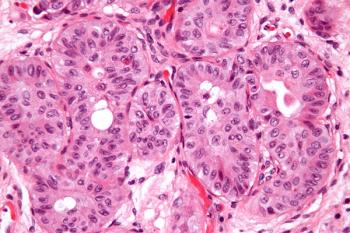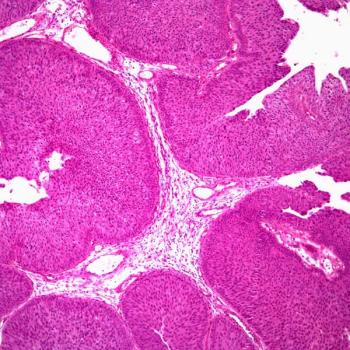
Data demonstrate the feasibility of automated glomerular filtration rate prediction to decide between partial nephrectomy and radical nephrectomy in kidney cancer, according to an expert from the Cleveland Clinic.

Your AI-Trained Oncology Knowledge Connection!


Data demonstrate the feasibility of automated glomerular filtration rate prediction to decide between partial nephrectomy and radical nephrectomy in kidney cancer, according to an expert from the Cleveland Clinic.

Early phase trials investigating cellular therapies, bispecific antibodies, and antibody-drug conjugates for refractory kidney cancer may uncover strategies to overcome resistance mechanisms.

Increasing cancer antigen presentation as well as working with tumor cells in and delivering novel cells to the microenvironment may help in overcoming mechanisms of immune checkpoint inhibitor resistance in refractory renal cell carcinoma.

Shilpa Gupta, MD, discusses bladder preserving strategies for unfit or young patients, trials assessing immunotherapy combinations, and results from the BLASST-1 trial presented at ASCO GU.

Lenvatinib plus pembrolizumab appears to be the best option for patients with refractory metastatic renal cell carcinoma who are progressing on immunotherapy combinations or are lenvatinib naïve.

Ipilimumab monotherapy does not appear effective in driving complete responses in refractory renal cell carcinoma despite yielding some progression-free survival intervals, according to an expert from the University of Texas Southwestern Medical Center.

An expert from the University of Texas Southwestern Medical Center discusses several phase 3 clinical trials supporting the use of various single-agent and combination immunotherapy regimens for advanced kidney cancer.

All patients with platinum-resistant, small-cell neuroendocrine prostate cancer who responded to treatment with BXCL701 plus pembrolizumab were microsatellite stable and/or tumor mutational burden–low with a low probability of response to pembrolizumab.

Shilpa Gupta, MD, shares the current standard of care for muscle-invasive bladder cancer and highlights other options that may be suitable for some patients.

An expert from Chase Comprehensive Cancer Center discusses how findings from a genomic analysis of the phase 2 BLASST-1 trial may identify biomarkers of response and resistance to nivolumab/chemotherapy in muscle-invasive bladder cancer.

Results from cohort A of the HCRN GU16-260 trial showed treatment-free survival was enhanced in patients with advanced renal cell carcinoma who received nivolumab monotherapy plus salvage nivolumab and ipilimumab maintenance.

A retrospective study clarifies how the implementation of avelumab maintenance looks in real-world practice, according to an expert from Seattle Cancer Care Alliance.

First-line maintenance with avelumab in locally advanced or metastatic urothelial carcinoma yields efficacy that appears consistent between clinical and real-world settings.

89Zr-DFO-girentuximab improves sensitivity and specificity in identifying clear cell kidney cancer compared with any metric to date, according to an expert from the University of California, Los Angeles.

Patients with locally advanced or metastatic renal cell carcinoma with a clear-cell component who receive first-line cabozatinib after checkpoint inhibitor combination therapy appear to have early responses.

Updated results from the phase 3 CheckMate 9ER trial continue to support nivolumab plus cabozantinib as a first-line treatment for patients with advanced or metastatic renal cell carcinoma.

When combined with nivolumab and ipilimumab, cabozantinib appears to improve outcomes over placebo for patients with advanced, intermediate-risk renal cell cancer, and showed some efficacy among the poor-risk population.

Results from the phase 3 IMvigor130 trial reveal a trend towards overall survival improvement when atezolizumab plus chemotherapy was given to patients with locally advanced or metastatic urothelial carcinoma vs placebo.

An exploratory analysis indicates that overall survival did not improve with the use of single-agent atezolizumab in untreated locally advanced or metastatic urothelial cancer.

Pembrolizumab appears to achieve antitumor activity in terms of disease-free survival in patients with Bacillus calmette-guerin–unresponsive, papillary high–risk, non-muscle invasive bladder cancer.

Extended follow-up findings further support the use of nivolumab as a standard of care in high-risk muscle-invasive urothelial carcinoma following radical resection.

Rucaparib yields improved efficacy compared with docetaxel plus androgen receptor pathway inhibitors in metastatic castration-resistant prostate cancer harboring BRCA mutations.

Data from the phase 2 TROPHY-U-01 trial support further evaluation of sacituzumab govitecan in patients with metastatic urothelial cancer following immune checkpoint inhibitor therapy, according to the lead investigator.

Investigators observe low rates of treatment discontinuation and adverse effects with radium-223 as treatment for castration-resistant prostate cancer and bone metastases.

Findings from the phase 2 UNITE study indicate that certain biomarkers may help inform clinical decision making and sequencing in patients with advanced urothelial carcinoma.

Almost half of patients with muscle-invasive bladder cancer in a phase 2 trial had clinical complete responses following transurethral resection of bladder tumors plus nivolumab and chemotherapy.

Niraparib plus abiraterone and prednisone continue to improve outcomes among patients with metastatic, castration-resistant prostate cancer and HRR gene alterations, according to interim data from the MAGNITUDE study.

Long-term safety data from the phase 3 ARAMIS rollover trial support the use of darolutamide in patients with nonmetastatic castration-resistant prostate cancer, according to an expert from the Carolina Urologic Research Center.

In a final overall survival analysis of the phase 3 PROpel study, abiraterone actetate/olaparib demonstrates a sustained trend toward overall survival for metastatic castration-resistant prostate cancer vs standard-of-care abiraterone.

Findings from the phase 3 ARASENS trial indicate that darolutamide plus androgen-deprivation therapy and docetaxel should be considered a new standard of care for metastatic hormone-sensitive prostate cancer.